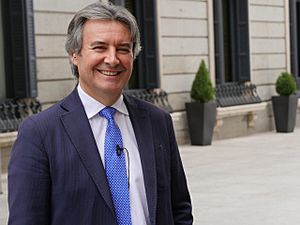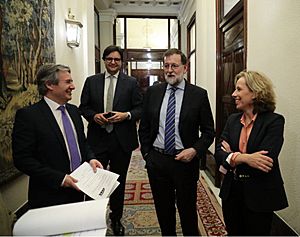Rubén Moreno Palanques facts for kids
Ruben Moreno Palanques was born in Castellón, Spain, on July 23, 1958. He is a Spanish politician who belongs to the conservative People's Party (PP). He studied medicine and earned his MD PhD from the University of Valencia. Ruben Moreno has held important roles in the Spanish government. He has been a Senator and a Member of Parliament (MP) in the Congress of Deputies. He also served as Secretary of State for Relations with Parliament and Secretary General of Health under different presidents.
Contents
Early Life and Education
Ruben Moreno became a doctor in medicine and surgery after studying at the University of Valencia. He was the first person in his family to become a doctor. However, his family was already involved in politics. His grandfather ran in local elections during the time of the Second Spanish Republic.
As a child, Ruben Moreno also studied music at the Professional Conservatory of Music in Valencia. He had to stop his music studies when he won a special scholarship. This scholarship allowed him to live away from home while he finished his medical studies.
Political Career
Between 1995 and 2000, Ruben Moreno worked in the Valencian government. He was the General Director of the Valencian Health Service. He also served as Undersecretary for the Valencian Ministry of Health. These roles involved managing health services in the Valencia region.
In 2000, when President Aznar began his second term, Ruben Moreno took on bigger roles. He became the Secretary General of Health Management and Cooperation. He also became the President of the National Health Service (INSALUD). During this time, he managed a huge transfer of health responsibilities. This meant moving control of health services from the national government to many different regions in Spain. This transfer involved a lot of money, many health workers, hospitals, and health centers.
In 2011, he was elected as a Member of Parliament (MP) for Valencia. He represented the conservative People's Party (PP). In Parliament, he spoke about health issues for his party. He also worked on European Union matters. He was also Vice President of the Toledo Pact Committee, which deals with social security. He was very active in European affairs during this time. He also helped analyze problems in the health system.
In December 2014, he left his MP seat. He was then appointed Secretary General of Health and Consumer Affairs. This was a key role in the Ministry of Health.
Facing the Hepatitis C Crisis
When Ruben Moreno joined the Ministry of Health in December 2014, a big health crisis was happening. Many patients with Hepatitis C needed new, expensive medicines. These medicines could cure the disease. Some countries were delaying these treatments.
Ruben Moreno and the new Minister, Alfonso Alonso, quickly created a plan. In less than a month, they set up a team of experts. This team created a national plan to treat Hepatitis C. They also managed to lower the cost of the new medicines by a lot. This plan helped treat and cure over 130,000 patients. Spain aims to get rid of Hepatitis C by 2024. This would be six years earlier than the World Health Organization's goal. Spain would be the second country in the world, after Iceland, to achieve this.
Handling a Diphtheria Case
In June 2015, a rare case of diphtheria appeared in Catalonia. Diphtheria is a disease that had almost disappeared in Spain. The patient was a child who had not been vaccinated. The child was treated in a hospital in Barcelona. Ruben Moreno worked hard to find a special medicine called diphtheria antitoxin. This medicine was very hard to find because the disease was so rare.
He searched different countries around the world. In less than 48 hours, he found the medicine in Russia. The Russian authorities quickly sent it to Spain. This quick action helped the child receive the necessary treatment.
Changes to Chickenpox Vaccine
For a long time, the chickenpox vaccine was given to Spanish teenagers at 12 years old. It was for those who had not had the disease or were at risk. However, many health groups suggested giving the vaccine to younger children. This meant parents had to pay for the vaccine themselves if they wanted their young children vaccinated early.
Minister Alfonso Alonso and Ruben Moreno worked to change this. In July 2015, they approved a new vaccination schedule. Starting in 2016, all young children would get the chickenpox vaccine. The first dose would be at 12-15 months, and the second between 3 and 4 years. By adding it to the official schedule, all families could get the vaccine for free.
Making Meningitis B Vaccine Available
The Meningitis B vaccine was approved in Europe in 2013. But in Spain, it was only available in hospitals. This meant people could not buy it at regular pharmacies. Pediatricians often recommended this vaccine. So, families had to travel to other countries to get it. Many families and regions asked the government to make the vaccine available in Spanish pharmacies.
Ruben Moreno helped push for a review of the vaccine. In September 2015, the rules were changed. The Meningitis B vaccine became available in Spanish pharmacies. This made it much easier for families to get their children vaccinated.
Ruben Moreno was elected as an MP again in 2015 and 2016. He served as a deputy spokesperson and helped coordinate committees. He also worked on foreign affairs and European Union matters. In February 2018, he was appointed Secretary of State for Relations with Parliament.
For his work, he has received important awards. These include the Grand Cross of the Royal Order of Isabella the Catholic and the Grand Cross of the Order of Civil Merit.
Awards and Honours
 Knight Grand Cross of the Royal Order of Isabella the Catholic (gcYC)
Knight Grand Cross of the Royal Order of Isabella the Catholic (gcYC)  Spain 2002
Spain 2002 Knight Grand Cross of the Order of Civil Merit (gcCM)
Knight Grand Cross of the Order of Civil Merit (gcCM)  Spain 2018
Spain 2018- Corresponding Academic of the Royal Academy of Medicine and Related Sciences of the Valencian Community.
See also
 In Spanish: Rubén Moreno Palanques para niños
In Spanish: Rubén Moreno Palanques para niños



